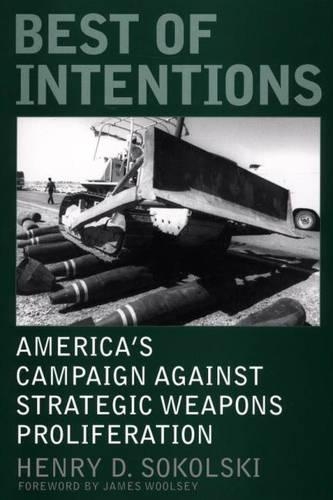
Best of Intentions: America's Campaign Against Strategic Weapons Proliferation
(Paperback)
Publishing Details
Best of Intentions: America's Campaign Against Strategic Weapons Proliferation
By (Author) Henry D. Sokolski
Bloomsbury Publishing PLC
Praeger Publishers Inc
30th April 2001
United States
Classifications
Tertiary Education
Non Fiction
Arms negotiation and control
327.1740973
Physical Properties
Paperback
184
Description
Although the United States efforts to prevent the spread of strategic weapons have varied significantly since 1945, they all presumed to be avoiding one or another type of strategic war. To the extent their military scenarios were sound, so too were the nonproliferation remedies these initiatives promoted. But, as Sokolski demonstrates, the obverse was also true--when these intiatives' military hopes and fears were mistaken, their nonproliferation recommendations also missed their mark. What is the best hope for breaking out of this box and securing a higher rate of nonproliferation success The United States must base nonproliferation policies less on insights concerning strategic military trends and more on the progressive economic and political trends that have increased the number of relatively peaceful, prosperous, liberal democracies. For the proliferating nations that are exceptions to this trend, the U.S. and its allies need to devise ways of competing that will encourage these governments to expend more energies shoring up their weaknesses and eventually giving way to less militant regimes. A major resource for students and military professionals interested in arms control and international relations.
Reviews
"Henry Sokolski's work earns wide regard because it is both informed and trenchant. His analysis offers valuable insights and presents important challenges--not only to those who have advocated prior non-proliferation initiatives but to those who contend that there are better options. Sokolski's study calls the former to reassess the mixed results of arms control policies, the latter to prove that, beyond complaints, they can in fact map a sounder path to security."-Alton Frye Vice President The Council on Foreign Relations
.,."a significant work of scholarship: the first comprehensive history of American efforts to stop the global spread of strategic weapons capabilities since World War 2. Any self-respecting grown-up will want to buy a copy immediately."-The Weekly Standard
.,."a well written and researched study of America's attempts to prevent the spread of nuclear weapons. The graphs, appendixes, and bibliography are excellent and exhaustive. A worthy purchase for university libraries and an excellent volume for graduate and undergraduate national security classes."-Choice
.,."Sokolski shows how many American nonproliferation efforts have been based on flawed understandings of the nuclear threat at various times. He concludes with strategies to correct for these misconceptions and offers some hope about the nature of the problem in the future."-Orbis
...a significant work of scholarship: the first comprehensive history of American efforts to stop the global spread of strategic weapons capabilities since World War 2. Any self-respecting grown-up will want to buy a copy immediately.-The Weekly Standard
...a well written and researched study of America's attempts to prevent the spread of nuclear weapons. The graphs, appendixes, and bibliography are excellent and exhaustive. A worthy purchase for university libraries and an excellent volume for graduate and undergraduate national security classes.-Choice
...Sokolski shows how many American nonproliferation efforts have been based on flawed understandings of the nuclear threat at various times. He concludes with strategies to correct for these misconceptions and offers some hope about the nature of the problem in the future.-Orbis
[It] contributes to multiple sets of literature. It belongs to the rich literature on nuclear doctrines, but breaks new ground in dissecting U.S. nonproliferation policy initiatives. In particular, the work belongs to an underdeveloped literature critiquing prevailing deterrence and arms control theory by emphasizing how intent, rather than capability, matters most to nuclear peace....It adds to the literature on U.S. foreign policy doctrines....the work links nonproliferation to the literature on the democratic peace and the importance of democracy-promotion. This final contribution may be even more crucial than Sokolski intended.-National Security Studies Quarterly
"It contributes to multiple sets of literature. It belongs to the rich literature on nuclear doctrines, but breaks new ground in dissecting U.S. nonproliferation policy initiatives. In particular, the work belongs to an underdeveloped literature critiquing prevailing deterrence and arms control theory by emphasizing how intent, rather than capability, matters most to nuclear peace....It adds to the literature on U.S. foreign policy doctrines....the work links nonproliferation to the literature on the democratic peace and the importance of democracy-promotion. This final contribution may be even more crucial than Sokolski intended."-National Security Studies Quarterly
..."a significant work of scholarship: the first comprehensive history of American efforts to stop the global spread of strategic weapons capabilities since World War 2. Any self-respecting grown-up will want to buy a copy immediately."-The Weekly Standard
..."a well written and researched study of America's attempts to prevent the spread of nuclear weapons. The graphs, appendixes, and bibliography are excellent and exhaustive. A worthy purchase for university libraries and an excellent volume for graduate and undergraduate national security classes."-Choice
..."Sokolski shows how many American nonproliferation efforts have been based on flawed understandings of the nuclear threat at various times. He concludes with strategies to correct for these misconceptions and offers some hope about the nature of the problem in the future."-Orbis
"[It] contributes to multiple sets of literature. It belongs to the rich literature on nuclear doctrines, but breaks new ground in dissecting U.S. nonproliferation policy initiatives. In particular, the work belongs to an underdeveloped literature critiquing prevailing deterrence and arms control theory by emphasizing how intent, rather than capability, matters most to nuclear peace....It adds to the literature on U.S. foreign policy doctrines....the work links nonproliferation to the literature on the democratic peace and the importance of democracy-promotion. This final contribution may be even more crucial than Sokolski intended."-National Security Studies Quarterly
Author Bio
Henry D. Sokolski is Executive Director of the Non-proliferation Policy Education Center.
